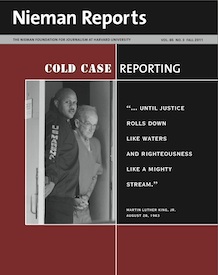Editor’s Note: Our sister publication Nieman Reports is out with their Fall 2011 issue, “Cold Case Reporting,” which focuses on process of revisiting old investigations to tell new stories. Over the next few days, we’ll highlight a few stories from the issue — but go read the whole thing. In this piece, Amy Alexander writes about the dynamics of race and writing about minorities in the newsroom.
This past summer a journalism controversy rooted in America’s troubled racial history erupted on the web. A young, white female reporter, Mac McClelland, wrote for Good magazine about brief stints she’d spent covering Haiti for Mother Jones. She described how she dealt with the emotional fallout that resulted in a form of post-traumatic stress disorder (PTSD) after she witnessed Haitians living in dire poverty and experiencing violence. To cope in the aftermath, she had developed something of an obsession with “violent sex.”
 The details McClelland shared in her June story were lurid and poignant: she described being so traumatized by the guns and by “gang-raping monsters who prowl the flimsy encampments of the earthquake homeless” that she began “fantasizing” about having sex at gunpoint. When she returned to the United States, McClelland wrote, she talked a former boyfriend into having sex with her in a way that would be “rougher” than anything she had ever experienced.
The details McClelland shared in her June story were lurid and poignant: she described being so traumatized by the guns and by “gang-raping monsters who prowl the flimsy encampments of the earthquake homeless” that she began “fantasizing” about having sex at gunpoint. When she returned to the United States, McClelland wrote, she talked a former boyfriend into having sex with her in a way that would be “rougher” than anything she had ever experienced.
Her essay blazed a quick, hot path through the blogosphere. Soon a multiracial coalition of some 36 women scholars, activists and journalists, including Slate blogger Marjorie Valbrun and New York Times correspondent Ginger Thompson, both of whom spent many years covering Haiti, sent an open letter to McClelland’s editors at Good. On July 1, the website Jezebel, whose audience is largely young women, published this letter. In it, the letter’s authors said that they respected “the heart” of McClelland’s story about her trauma, but they objected to her portrayal of Haiti as what they called “a heart-of-darkness dystopia.”